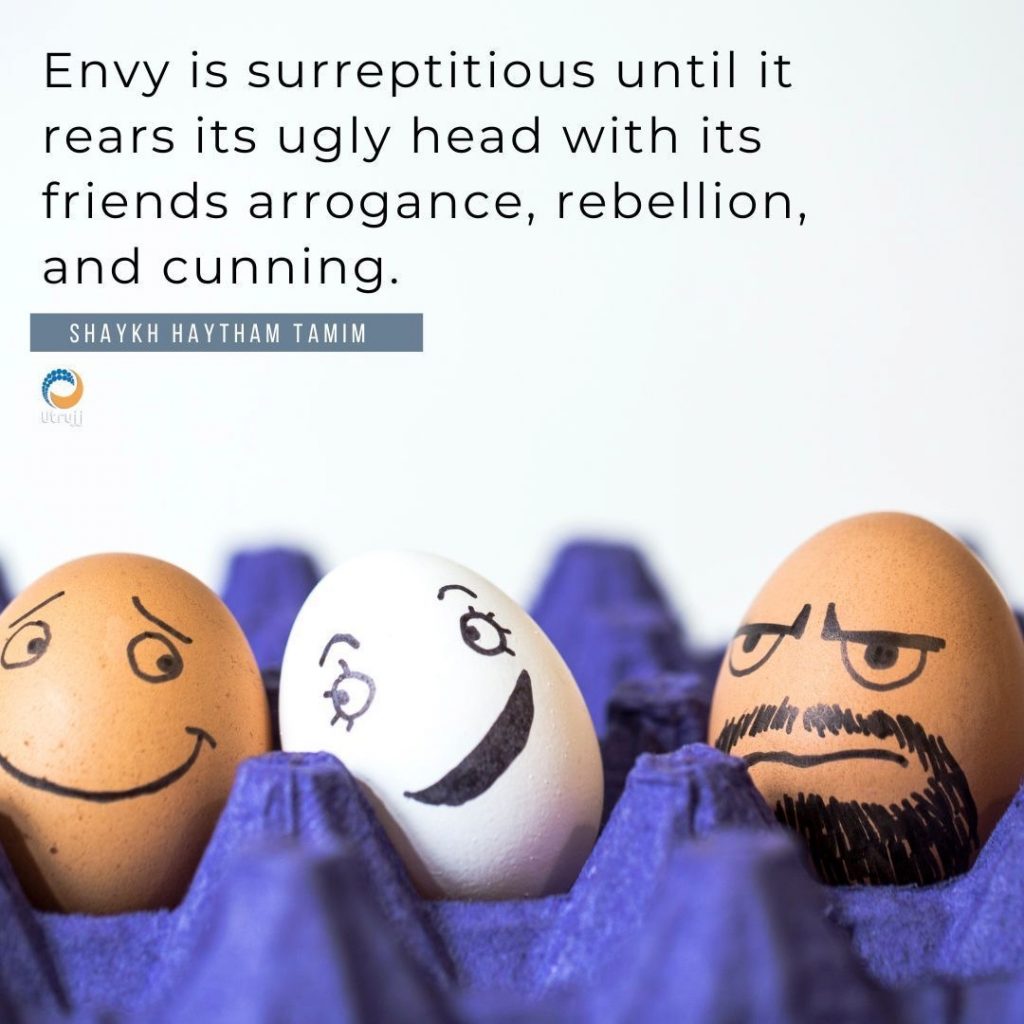Envy = a lack of trust in Allah – Tarawih Reflections 21

Allah Almighty said:
‘And do not crave what Allah has given some of you over others.’ [4:32]
In this ayah of Surat an-Nisa, Allah is addressing the very common disease of hasad, envy. For example, if someone is not happy with the division of inheritance that was laid out earlier in the surah, this stems from envy that someone else has more than you. But the real core of envy is a lack of trust in Allah, who alloted these shares.
This also applies to other situations. If you are unhappy that your neighbour has a better house, job, car, etc. than you, then knowingly or unknowingly you are actually unhappy with Allah, who gave this neighbour their provision. Objecting to what Allah has distributed means you are doubting His wisdom, whether you realise it or not.
There are many other verses dealing with hasad throughout the Quran, including the whole of Surat al-Falaq, which we should be reciting every day. Similarly, there are lots of hadith from different occasions when the Prophet Muhammad ﷺ discussed this issue. For example,
عَنْ أَبِي هُرَيْرَةَ - رضى الله عنه - قَالَ: قَالَ رَسُولُ اَللَّهِ - صلى الله عليه وسلم -{ إِيَّاكُمْ وَالْحَسَدَ, فَإِنَّ اَلْحَسَدَ يَأْكُلُ اَلْحَسَنَاتِ, كَمَا تَأْكُلُ اَلنَّارُ اَلْحَطَبَ } أَخْرَجَهُ أَبُو دَاوُدَ .
‘Beware of envy, as envy devours good deeds just as fire consumes wood.’ [Abu Dawood]
The reason envy eats up your good deeds is because it means you lack trust in Allah. And because you will backbite the one you envied, he will take your hasanat (good deeds).
We can’t see the full picture
All of us probably know someone whom Allah has provided with huge wealth, even though they are uneducated and may seem undeserving. Meanwhile someone who may be highly educated, with multiple degrees, etc., could be working for the uneducated person.
This is Allah’s division, and we can’t object to it. He has put things in the right places, we just can’t see it because we are limited – in our senses and in our understanding and knowledge. We can only see one little corner of the universe, but we still want to judge the whole universe from just this window.
This is similar to the story of Musa and Khidr (peace be upon them). Musa objected to Khidr’s actions because he couldn’t see the full picture, while Allah had given Khidr the knowledge. We are in the position of Musa, while only Allah has the full picture. This is why we have to trust in His wisdom.

Permissible envy
Hasad is when you are unhappy that someone else has something you don’t have, and wish for it to be taken away from them. This is haram.
However, on the opposite side we also have ghibta, which we could call permissible envy. This is when you see somebody else’s provision and wish for them to keep it and get barakah from it, while at the same time wishing for Allah to give you something similar or better.
We need to distinguish between these two.
Your rizq was written before you were born
Allah, in His ultimate wisdom, apportioned your rizq before you were even created.
Prophet Muhammad (peace be upon him) said that when a foetus has been in the womb for one hundred and twenty days,
ثُمَّ يُبْعَثُ إِلَيْهِ الْمَلَكُ فَيُؤْذَنُ بِأَرْبَعِ كَلِمَاتٍ، فَيَكْتُبُ رِزْقَهُ وَأَجَلَهُ وَعَمَلَهُ وَشَقِيٌّ أَمْ سَعِيدٌ
‘Allah sends His angel to it with instructions concerning four things, so the angel writes down its rizq (provision), its life span, its conduct; and whether it will be happy or miserable. (Bukhari and Muslim)
‘Rizq’ here could mean wealth, but it could also refer to health, beauty, etc.
We ask Allah to make us satisfied with what He has provided for us, and to make us people of goodness, not hasad. Ameen
Based on the reflections of Shaykh Haytham Tamim
Transcribed by Hana Khan
Related posts
Please donate generously
Related posts
From passive observer to active reformer
Freewill, guidance and destiny
- The truth is more powerful than lies
- Does a bride’s wali have to be Muslim?
- Is is permissible to lead a salah split over different rooms?
- Global IT outage. When systems go down…
- The concept of worship. What are ibadah and ihsan – and how do they lead to self development?
Recommended Posts

The truth is more powerful than lies
July 26, 2024

Global IT outage. When systems go down…
July 19, 2024

